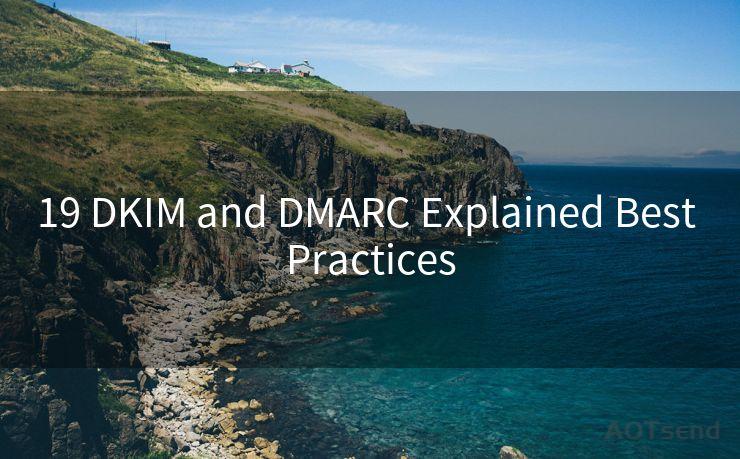19 DKIM and DMARC Explained Best Practices




Email authentication has become a crucial aspect of digital communication, especially in the fight against spam and phishing attacks. Among the various authentication methods, DKIM (DomainKeys Identified Mail) and DMARC (Domain-based Message Authentication, Reporting, and Conformance) stand out as powerful tools to ensure the integrity and authenticity of emails. In this article, we'll delve into the best practices for implementing DKIM and DMARC, exploring their functions and how they can enhance your email security.
🔔🔔🔔
【AOTsend Email API】:AOTsend is a Managed Email Service for sending transactional emails. Support Email Types: reminders, authentication, confirmations, notifications, verification codes, invoices, password resets, account activations, billing statements, two-factor authentication (2FA), and one-time passwords (OTP) emails, etc. $0.28 per 1000 Emails. 99% Delivery, 98% Inbox Rate.
You might be interested in:
Why did we start the AOTsend project, Brand Story?
What is a Managed Email API, How it Works?
Best 25+ Email Marketing Platforms (Authority,Keywords&Traffic Comparison)
Best 24+ Email Marketing Service (Price, Pros&Cons Comparison)
Email APIs vs SMTP: How they Works, Any Difference?
1. Understanding DKIM
DKIM, or DomainKeys Identified Mail, is an email authentication technique that allows the receiver to check that an email was indeed sent and authorized by the owner of a domain. It works by adding a digital signature to the email's header, which can be verified by the receiving server.
Best Practices for DKIM
- Generate a Strong Key Pair: Use a strong and unique key pair for signing your emails. Keep the private key secure and only accessible to authorized personnel.
- Select the Right Selector: The selector is part of the DKIM signature and helps identify the key used for signing. Choose a meaningful selector that represents your organization or domain.
- Sign All Outgoing Emails: Ensure that all emails sent from your domain are DKIM-signed. This enhances trustworthiness and reduces the chances of your emails being marked as spam.
2. DMARC: The Next Level of Protection
DMARC, or Domain-based Message Authentication, Reporting, and Conformance, takes email authentication to the next level. It builds upon SPF (Sender Policy Framework) and DKIM to provide a policy framework for handling unauthenticated emails.
Best Practices for DMARC
- Define a Clear Policy: Set a clear DMARC policy that defines how unauthenticated emails should be handled. You can choose to quarantine or reject such emails.
- Gradual Implementation: Don't rush into a strict policy immediately. Start with a monitoring policy, analyze the reports, and gradually move to a stricter policy.
- Monitor and Adjust: Regularly monitor your DMARC reports to identify any authentication issues and adjust your policy accordingly.
3. Integrating DKIM and DMARC
For maximum effectiveness, DKIM and DMARC should be used together. DKIM ensures the integrity and authenticity of emails, while DMARC provides a framework for handling unauthenticated messages.
Integration Best Practices
- Align Your Policies: Ensure that your DKIM and DMARC policies are aligned and complement each other.
- Regular Auditing: Periodically audit your email authentication setup to ensure it's working as intended.
- Education and Training: Train your team on the importance of email authentication and how to handle potential issues.
4. Benefits of DKIM and DMARC Implementation
Implementing DKIM and DMARC brings numerous benefits, including improved email deliverability, reduced spam complaints, and enhanced brand reputation.
By following these best practices and integrating DKIM and DMARC into your email infrastructure, you can significantly improve your email security and trustworthiness. In today's digital landscape, where phishing and spam attacks are rampant, these authentication methods are crucial for protecting your organization and your customers.





Scan the QR code to access on your mobile device.
Copyright notice: This article is published by AotSend. Reproduction requires attribution.
Article Link:https://www.mailwot.com/p5905.html



